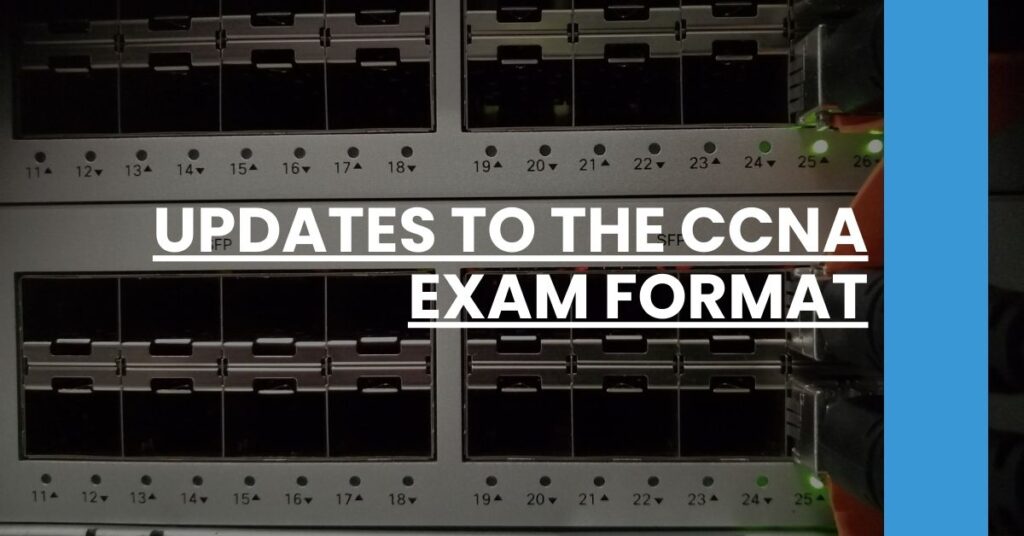The current CCNA exam landscape is evolving, and it’s essential to stay informed.
- Exam Content for the Current CCNA: Get a thorough grip on the latest topics and technologies tested.
- CCNA Exam Strategies: Learn effective study techniques tailored for the current iteration.
- Career Advancement Post-CCNA: Discover the wide array of opportunities unlocked with passing scores.
Embarking on the current CCNA challenge is a strategic career move.
- Understanding the CCNA Certification
- Exam Overview: Cisco’s CCNA Exam Format
- Key Topics Covered in the CCNA Exam
- Preparing for the CCNA: Study Materials and Resources
- Exam Preparation Tips and Best Practices
- Understanding the Exam Scoring and Passing Criteria
- The Importance of Practical Experience
- Registration and Scheduling Your CCNA Exam
- Career Opportunities and Advancement Post-CCNA Certification
- Staying Updated: Keeping Pace with Cisco’s Exam Updates
- Conclusion: Taking the Next Steps Towards CCNA Certification
Understanding the CCNA Certification
The CCNA certification is a globally recognized credential pivotal to a budding network professional’s career. Offered by Cisco, a heavyweight in networking technologies, this certification sets a foundation in networking concepts crucial for any IT expert. It serves not just as a benchmark for your skills but catapults your standing in the competitive job market. By completing the CCNA, you signal to employers that you have what it takes to handle advanced network solutions.
Why Is CCNA So Valued?
- Industry Recognition: Securing a CCNA certification speaks volumes about your expertise in the field, enhancing your profile in front of potential employers.
- Stepping Stone to Advanced Certifications: It’s not just an end—it’s a beginning. The CCNA opens doors to more specialized Cisco certifications, letting you carve a niche for yourself in the IT sphere.
- Updated Skill Set: As you prepare for the current CCNA exam, you are also staying updated with the latest networking trends, an invaluable asset in today’s ever-evolving tech landscape.
Exam Overview: Cisco’s CCNA Exam Format
The CCNA exam, known formally as the 200-301 CCNA, assesses a candidate across various segments of networking technology through a mixture of question types such as multiple-choice, drag-and-drop, and simulations. You will find yourself against the clock, with 120 minutes to prove your networking mettle. The exam structure is designed to test not only theoretical understanding but practical knowledge.
What Constitutes the CCNA Exam Format?
- Types of Questions: Expect to navigate through scenarios and simulations where your quick decision-making and problem-solving skills are evaluated.
- Subjects to Focus On: The domains extend from network fundamentals and access to IP connectivity, IP services, security fundamentals, and a pinch of automation and programmability.
Key Topics Covered in the CCNA Exam
Preparing for the current CCNA exam means taking a deep dive into an ocean of networking principles and practical scenarios. With topics geared towards real-world applications, you’ll encounter Cisco’s DNA center, the intricacies of network layers, and the ins and outs of security protocols—each woven into the fabric of modern network environments.
Crucial Topics to Ace the CCNA Exam
- Network Fundamentals: Layers of the OSI and TCP/IP models, subnetting, and routing basics forge the backbone of the exam.
- Security Protocols: You’re expected to know the differences and applications of security protocols, a subject that Cisco Net Solutions notes as critical in today’s network scenarios.
Preparing for the CCNA: Study Materials and Resources
In your CCNA journey, preparation is your compass. There’s a wealth of study materials and resources at your disposal, from Cisco’s official material to third-party guides and interactive labs. Mix and match resources to create a study plan that resonates with your learning style.
Resources to Propel Your Preparation
- Official Cisco Material: Cisco offers comprehensive guides and labs that provide a firsthand understanding of the concepts you’ll face in the exam.
- Online Courses: Platforms like Simplilearn offer structured programs combined with hands-on labs for an immersive learning experience.
Exam Preparation Tips and Best Practices
Effective preparation transcends cramming books and taking practice exams. It’s about cultivating the right study habits, managing your time efficiently, and staying composed under the examination pressure. This segment will look at strategies to optimize your preparation for the current CCNA exam.
Strategies for CCNA Exam Success
- Combine Theory and Practice: A blend of theoretical learning and practical application ensures you’re well-rounded in your knowledge.
- Time Management: Allocate specific study times for each topic, ensuring you cover all ground before D-day.
- Stay Calm: Practice mindfulness or stress-reduction techniques to keep your cool, a recommendation supported by success narratives from NWExam, highlighting the importance of a steady mind.
Remember, each of these ideas brings you one step closer to passing the current CCNA exam.
Understanding the Exam Scoring and Passing Criteria
Navigating the current CCNA exam includes understanding how your performance translates into scores. Cisco has a scale that ranges generally from 300 to 1000, with the passing threshold commonly hovering around the 825 marks, although Cisco could alter this benchmark for different versions of the exam. Don’t be too concerned with the numerical score, though; what matters is meeting or exceeding that passing line.
What to Know About Scoring
- Scaled Scoring System: Your raw score is converted into a scaled score that reflects a consistent level of difficulty across different exam versions.
- Passing Score: Typically, you’ll need to score approximately 825 out of 1000, but always check the specific criteria for the current test administration.
- No Penalty for Guessing: Cisco does not penalize for incorrect answers, so it’s in your best interest to answer all questions.
Should you fall short of the mark, don’t lose heart. Cisco’s policies allow you to retake the exam after a set period, usually five business days.
The Importance of Practical Experience
If the current CCNA exam is your destination, then practical experience is the vehicle that will effectively get you there. Beyond book smarts, your hands-on ability to configure and troubleshoot a network is what will carry you through many of the exam’s scenario-based questions.
Gaining Valuable Skills
- Lab Work: Invest time in labs that simulate real-world networking environments.
- Networking Internships: If possible, apply for internships or entry-level positions that provide practical networking experience.
- Personal Projects: Set up your own home network to experiment with different configurations. This practical experience is invaluable and cannot be underestimated.
Registration and Scheduling Your CCNA Exam
When you feel ready to take on the current CCNA exam, scheduling your test is the next logical step. You’ll register through Pearson VUE, Cisco’s authorized test delivery partner. Ensure your study plan allows for ample revision time leading up to your chosen date.
Steps to Schedule the Exam
- Create an Account: Set up an account on the Pearson VUE website.
- Find a Test Center: Locate a testing center near you or choose the online testing option.
- Pick a Date: Select an exam date that gives you enough time for thorough preparation.
Come exam day, ensure you have a valid ID, know the test center’s location, and arrive early to settle any jitters.
Career Opportunities and Advancement Post-CCNA Certification
The current CCNA exam is more than a hurdle to clear— it’s a gateway to myriad career opportunities. Showcasing your CCNA badge can make an impactful difference in your job prospects and professional growth.
Doors Opened by CCNA Certification
- Network Engineer: Steer your career towards designing and managing network solutions.
- Systems Administrator: Leap into managing an organization’s IT infrastructure with a focus on network components.
- IT Manager: Your CCNA knowledge can position you for broader IT management roles as you gain more experience.
The Cisco certification path also offers advanced certifications, allowing you to specialize even further as you build upon the CCNA base. Earning the CCNA is shown to increase your job prospects, strengthening your case when negotiating salaries or applying for promotions.
Staying Updated: Keeping Pace with Cisco’s Exam Updates
Staying current in the IT field means being on top of any changes to certifications like the CCNA. Cisco typically refreshes its exam content every few years to reflect the latest networking technologies and industry demands.
Keeping Your Certification Relevant
- Continuing Education: Pursue ongoing learning opportunities through Cisco’s recertification program.
- Community Engagement: Join Cisco’s online community to stay informed about the latest networking trends and exam changes.
- Regular Check-Ins: Regularly visit the Cisco Learning Network for updates and study material refreshers.
Conclusion: Taking the Next Steps Towards CCNA Certification
Your journey through the current CCNA exam may be challenging, but it is indisputably rewarding. The right preparation, a solid understanding of both theory and practice, and an eye on evolving trends will contribute significantly to your success. Carry with you the tips and insights provided, and step confidently towards not just passing the CCNA exam but also elevating your career in the vast field of networking.

